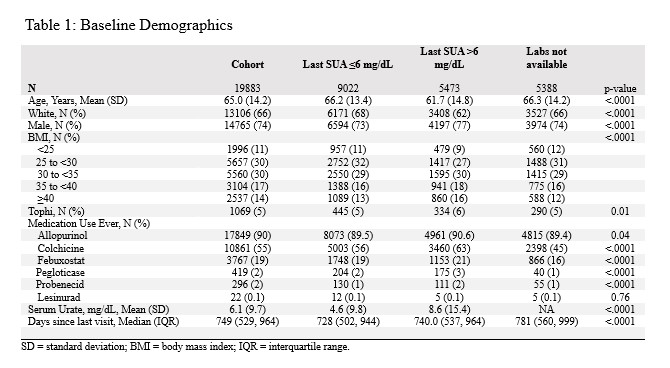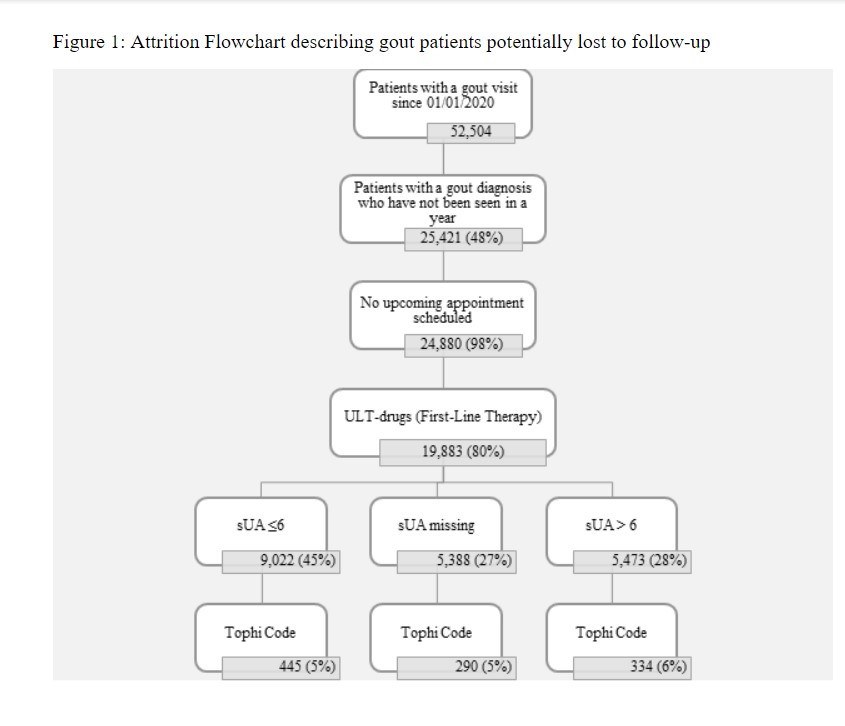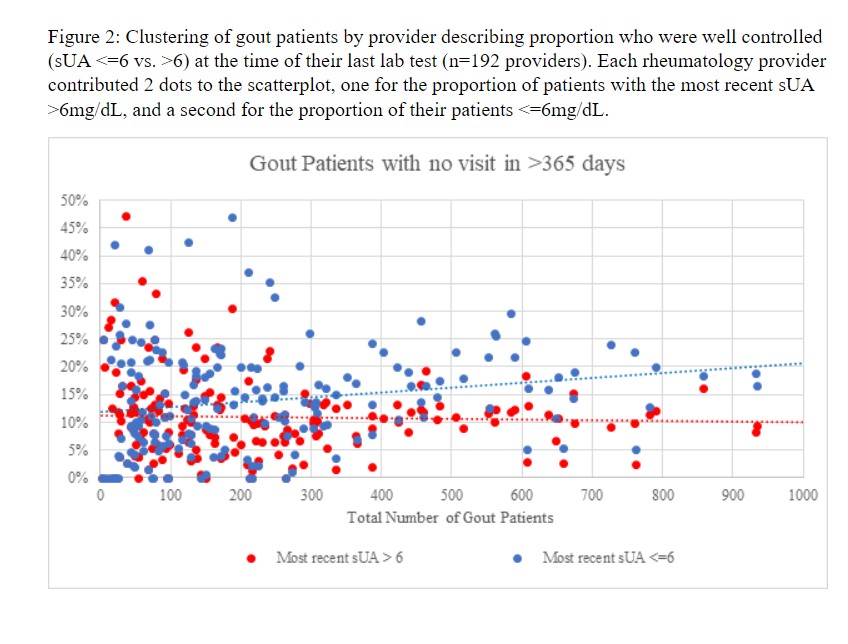Session Information
Date: Monday, November 13, 2023
Title: (1100–1123) Metabolic & Crystal Arthropathies – Basic & Clinical Science Poster II
Session Type: Poster Session B
Session Time: 9:00AM-11:00AM
Background/Purpose: Treatment of patients with gout can be complex and, given the episodic nature of gout attacks, gout patients may not always return for regular appointments, making long-term management and fostering medication adherence more difficult.We sought to identify and describe patients with gout who were lost-to-care in the Excellence Network in RheumatoloGY (ENRGY), a large community rheumatologist practice-based research network,as preparatory to an intervention to re-engage these patients in care.
Methods: We conducted a retrospective analysis of gout patients who had at least one rheumatology visit from 01/01/2020 to 05/31/2022 using electronic health records (EHRs). Eligible patients meeting our definition of presumed lost-to-follow-up must have >1 ICD10 gout diagnosis (M10* or M1A*), previous use of gout medications (e.g.allopurinol and febuxostat), most recent rheumatology visit >365 daysprior,and no future visit scheduled. We analyzed demographics for the eligible cohort and stratified by the most recent serum urate (SU) value (if available) using descriptive statistics. Serum urate value of ≤6 mg/dL indicated that the gout treatment target was achieved. A scatter plot shows the distribution of patients by rheumatology office and last SUvalue.
Results: From a total of 52,504 gout patients who had a specialist gout visit since 1/1/2020, we identified 25,421(48%) gout patients from 201 sites nationwide (Figure 1) who had not been seen in a year or more. After limiting to patients without a future appointment scheduled (98%) and those who had been on therapy (80%), there were 19,883 (38% of the overall cohort) patients that met all inclusion criteria for being lost-to-care. Patients were mostly male (74%), white (66%), with a mean (SD) age of 65(14.2) (Table 1). In patients where structured SU lab data was available (73% of the lost-to-care cohort), 38% were poorly controlled at their last visit (SU >6). The median (IQR) days since the most recent rheumatology provider visit was 749 (529, 964) days. Gout with tophi was coded in about 5% of patients and was slightly higher in the SUA >6 group. The scatter plot (Figure 2) shows the difference in distribution patterns among practices of patients who may have met their treatment target (SU<6) compared to those whose last SU was greater than 6.
Conclusion: In this large community practice-based rheumatology network, a meaningfully large proportion of gout patients appeared lost to care. Many of these patients were sub-optimally controlled (SU >6 mg/dL) at their last rheumatologist visit, suggesting that they may benefit from further rheumatology involvement. A quality improvement initiative is in development to better understand these patients’ gout care needs and offer them an expedited visit with their rheumatology provider to re-engage them in care and potentially improve outcomes.
To cite this abstract in AMA style:
Mudano A, Ryan J, Holladay E, Methric K, Grauer D, LaMoreaux B, Xie F, Curtis J. Finding Lost-to-Care Gout Patients in a Large Community Rheumatology Network: Patient Re-engagement Initiative with Metrics (PRIME) [abstract]. Arthritis Rheumatol. 2023; 75 (suppl 9). https://acrabstracts.org/abstract/finding-lost-to-care-gout-patients-in-a-large-community-rheumatology-network-patient-re-engagement-initiative-with-metrics-prime/. Accessed .« Back to ACR Convergence 2023
ACR Meeting Abstracts - https://acrabstracts.org/abstract/finding-lost-to-care-gout-patients-in-a-large-community-rheumatology-network-patient-re-engagement-initiative-with-metrics-prime/



